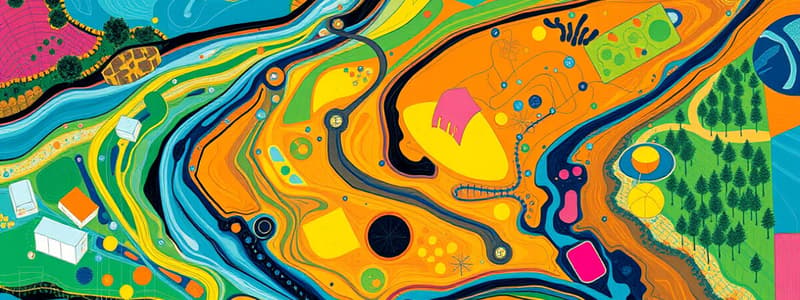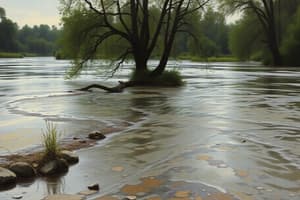Podcast
Questions and Answers
What is the primary focus of Water-Resources Engineering?
What is the primary focus of Water-Resources Engineering?
- Designing transportation infrastructure
- Management of water-related projects (correct)
- Environmental conservation methods
- Analysis of weather patterns
Which of the following is NOT a field of Water Resources Engineering?
Which of the following is NOT a field of Water Resources Engineering?
- Hydroelectric-power development
- Storm drainage
- Flood mitigation
- Soil analysis (correct)
What is the primary method used to evaluate water quality?
What is the primary method used to evaluate water quality?
- Meteorological assessments
- Geological surveys
- Hydrologic studies
- Chemical and bacteriologic tests (correct)
Which type of rain gauge uses a mechanism that tips based on the accumulation of rainfall?
Which type of rain gauge uses a mechanism that tips based on the accumulation of rainfall?
How is the amount of precipitation typically measured?
How is the amount of precipitation typically measured?
What characterizes a river basin?
What characterizes a river basin?
What method involves calculating areal precipitation by taking the average of multiple point measurements?
What method involves calculating areal precipitation by taking the average of multiple point measurements?
Which method uses graphical techniques to assign weights to measurement stations based on area?
Which method uses graphical techniques to assign weights to measurement stations based on area?
Which technique is essential in the structural design of hydraulic structures?
Which technique is essential in the structural design of hydraulic structures?
What aspect of water management is primarily addressed by pollution control?
What aspect of water management is primarily addressed by pollution control?
Which technique estimates rainfall by drawing lines of equal rainfall based on point measurements?
Which technique estimates rainfall by drawing lines of equal rainfall based on point measurements?
Which precipitation estimation technique is based solely on arithmetic calculations without graphical representation?
Which precipitation estimation technique is based solely on arithmetic calculations without graphical representation?
Which type of precipitation includes snow, hail, and sleet?
Which type of precipitation includes snow, hail, and sleet?
Flashcards
Water Resources Engineering
Water Resources Engineering
Study and management of water using equipment, facilities, and techniques.
Flood Mitigation
Flood Mitigation
Strategies to reduce the impact of floods.
Storm Drainage Systems
Storm Drainage Systems
Systems designed to remove excess water from surfaces during rain events.
Sewerage Management
Sewerage Management
Signup and view all the flashcards
Water Supply Systems
Water Supply Systems
Signup and view all the flashcards
Irrigation
Irrigation
Signup and view all the flashcards
Hydroelectric Power
Hydroelectric Power
Signup and view all the flashcards
Pollution Control Measures
Pollution Control Measures
Signup and view all the flashcards
River Basin (Catchment)
River Basin (Catchment)
Signup and view all the flashcards
Precipitation
Precipitation
Signup and view all the flashcards
Rain Gauge
Rain Gauge
Signup and view all the flashcards
Arithmetic Mean (Precipitation)
Arithmetic Mean (Precipitation)
Signup and view all the flashcards
Thiessen Network
Thiessen Network
Signup and view all the flashcards
Study Notes
Water Resources Engineering Overview
- Focuses on the study and management of water through specialized equipment, facilities, and techniques.
- Aims to control, utilize, and manage water quality effectively.
Fields of Water Resources Engineering
-
Control of Water:
- Flood mitigation strategies.
- Storm drainage systems development.
- Sewerage management solutions.
- Design of highway culverts for efficient water flow.
-
Utilization of Water:
- Establishment of sustainable water supply systems.
- Irrigation practices for agriculture.
- Development of hydroelectric power resources.
- Navigation improvements to facilitate transport.
-
Water Quality Management:
- Implementation of pollution control measures to ensure safe water use.
Water Quantity and Quality Considerations
- Initial focus on the quantity of water needed for various utilizations.
- Application of hydrology to determine peak flow rates and overall water volume requirements.
Water Quality Assessment
- Water quality issues arise in planning for water supply, irrigation, and wastewater disposal.
- Chemical and bacteriological tests assess impurities in water to maintain quality.
- Hydrologic studies address the effectiveness of wastewater management plans.
Hydraulic Structures
- Structural design in water resources combines principles of civil engineering and fluid mechanics.
- Hydraulic characteristics dictate the shape and dimensions of water infrastructure.
The Hydrologic Cycle and River Basins
- Understanding the hydrologic cycle is crucial for managing water resources.
- A river basin (or catchment) is defined by the area that drains into a specific stream, separated from adjacent basins by ridges on topographic maps.
- All surface water from a basin flows to the lowest point in the divide leading to the main stream.
Precipitation and Measurement
- Types of precipitation include liquid (rainfall) and frozen (snow, hail, sleet, freezing rain).
- Precipitation is measured as depth in inches or millimeters on a level surface.
Rain Gauges
- Common types of rain gauges include:
- Standard rain gauge for basic measurements.
- Weighing rain gauge for precise readings.
- Tipping-bucket gauge for automated data collection.
Computation of Average Precipitation
-
Arithmetic Mean:
- Calculates average precipitation using the mean of all measurements.
-
Thiessen Network:
- Graphically determines station weights based on relative areas; sums weighted observations for average rainfall.
-
Isohyetal Method:
- Uses graphical estimation to draw lines of equal rainfall and calculates areal precipitation by assessing the area covered.
Studying That Suits You
Use AI to generate personalized quizzes and flashcards to suit your learning preferences.




